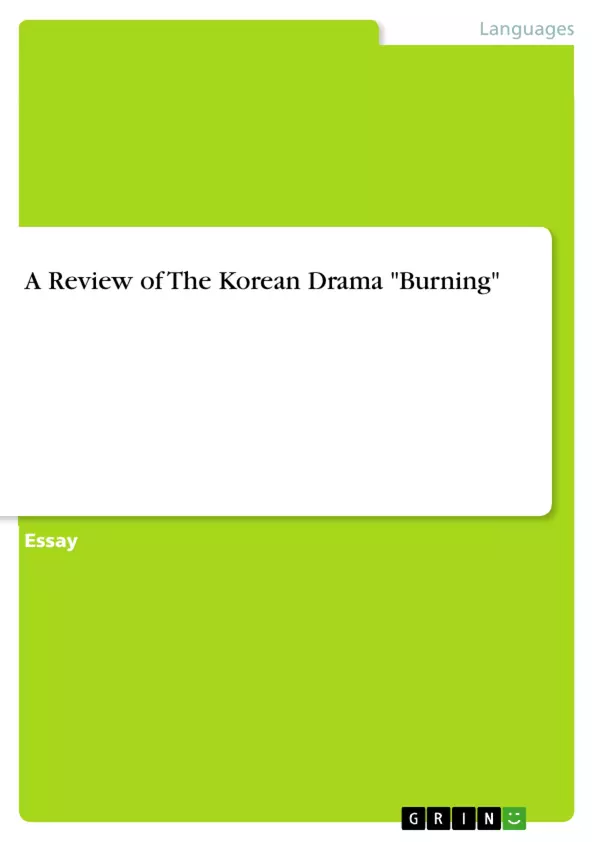Burning (버닝) released in 2018, is a Korean psychological thriller, co-written, produced, and directed by director Lee Chang-dong. The drama is an alteration of a short story titled “Barn Burning” written by Haruki Murakami. Lee Chang-dong re-contextualizes the piece to exhibit an exclusive narrative of economic inequality, loneliness, and other hardships of an entire generation of young Koreans in recent years, through the eyes of protagonist Lee Jong-su, a working-class young man from Paju, South Korea. By submitting an overview to the story, this paper includes a summary of the plot with emphasis on the life of Lee Jung-So. In the latter part the essay will take a closer look at the important motifs Burning highlights, mainly focusing on the theme of the pervasive feeling of loneliness, not unusual for adolescents in today’s world.
Inhaltsverzeichnis (Table of Contents)
- Plot Summary and Lee Jong-su's Life
- Loneliness and Isolation
Zielsetzung und Themenschwerpunkte (Objectives and Key Themes)
The objective of this paper is to provide an overview of the Korean drama Burning (2018), focusing on its portrayal of economic inequality, loneliness, and other hardships experienced by young Koreans. The analysis emphasizes the life of protagonist Lee Jong-su and explores key motifs within the film.
- Economic Inequality and Class System
- Loneliness and Isolation among Young Adults
- Toxic Masculinity and Jealousy
- The Search for Connection and Belonging
- Justice and Revenge
Zusammenfassung der Kapitel (Chapter Summaries)
Plot Summary and Lee Jong-su's Life: This section summarizes the plot of Burning, focusing on the life of Lee Jong-su, a working-class young man from Paju. It details his chance encounter with his childhood friend, Shin Hae-mi, their relationship, and the subsequent events that unfold after Hae-mi returns from a trip to Africa with a mysterious man named Ben. The summary highlights Jong-su's responsibilities, his growing attachment to Hae-mi, and his suspicion surrounding Ben's involvement in Hae-mi's disappearance. The section sets the stage for a deeper exploration of the film's themes by introducing the central characters and the central conflict. The contrast between Jong-su's isolated rural life and the vibrant urban setting of Seoul is also emphasized, showcasing the disparity in lifestyles and opportunities.
Loneliness and Isolation: This section delves into the pervasive theme of loneliness and isolation, exploring how it affects each of the three protagonists. The analysis focuses on Jong-su's social withdrawal, his struggles with communication, and his desperate need for connection. It examines scenes that highlight the theme, such as Jong-su waiting for a part-time job alongside others glued to their phones and his mother's detached visit seeking financial support. The summary contrasts Jong-su's experience with those of Hae-mi and Ben, highlighting the different ways loneliness manifests itself and its impact on their actions and relationships. The section connects the pervasive loneliness to broader societal issues in contemporary South Korea, emphasizing the importance of social groups in Korean identity and the struggle to form meaningful connections in an increasingly individualistic world. The discussion includes Hae-mi's search for validation and her metaphorical "great hunger," illustrating her attempts to connect and belong. Ben's isolated life, despite his outward success, further emphasizes the film's exploration of the loneliness experienced across different social strata.
Schlüsselwörter (Keywords)
Korea, Lee Jong-su, Shin Hae-mi, Haruki Murakami, economic inequality, class system, isolation, loneliness, toxic masculinity, sexual jealousy, gender inequality, justice, revenge, South Korean society, psychological thriller.
Frequently asked questions
What is the document about?
This document is a comprehensive language preview of an academic analysis of the Korean drama Burning (2018). It includes the table of contents, objectives and key themes, chapter summaries, and keywords.
What is the main objective of the academic analysis?
The objective is to provide an overview of the Korean drama Burning, focusing on its portrayal of economic inequality, loneliness, and other hardships experienced by young Koreans. It emphasizes the life of protagonist Lee Jong-su and explores key motifs within the film.
What are the key themes explored in the analysis of "Burning"?
The key themes include: economic inequality and the class system, loneliness and isolation among young adults, toxic masculinity and jealousy, the search for connection and belonging, and justice and revenge.
What does the "Plot Summary and Lee Jong-su's Life" chapter cover?
This chapter summarizes the plot of Burning, focusing on Lee Jong-su, a working-class young man from Paju. It details his encounter with Shin Hae-mi, their relationship, and the events that unfold after Hae-mi's return from Africa with Ben. It highlights Jong-su's responsibilities, his growing attachment to Hae-mi, and his suspicion surrounding Ben's involvement in her disappearance.
What is analyzed in the "Loneliness and Isolation" chapter?
This chapter delves into the theme of loneliness and isolation, exploring how it affects Lee Jong-su, Shin Hae-mi, and Ben. It focuses on Jong-su's social withdrawal, struggles with communication, and need for connection. It also examines how loneliness manifests differently in each character and its broader connection to societal issues in contemporary South Korea.
What keywords are associated with the analysis of "Burning"?
The keywords include: Korea, Lee Jong-su, Shin Hae-mi, Haruki Murakami, economic inequality, class system, isolation, loneliness, toxic masculinity, sexual jealousy, gender inequality, justice, revenge, South Korean society, psychological thriller.
- Citar trabajo
- Anónimo,, 2023, A Review of The Korean Drama "Burning", Múnich, GRIN Verlag, https://www.grin.com/document/1569198



